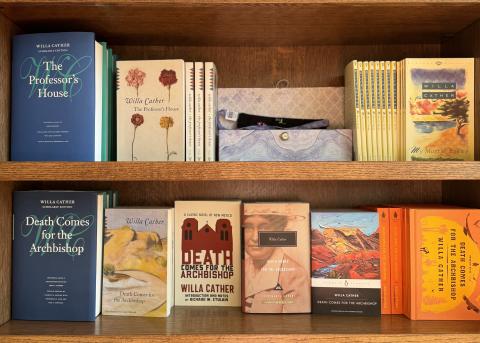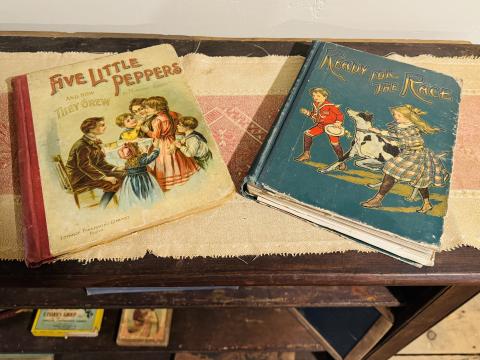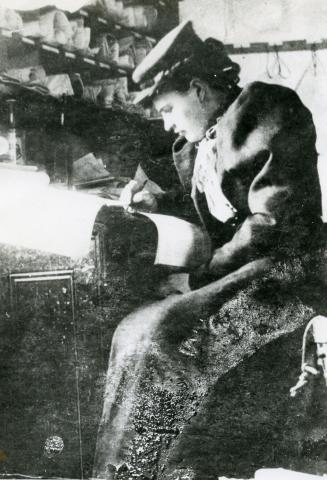


"Books Old and New"
Today is National Book Lovers Day and a fine day to celebrate a love of books and reading, as Willa Cather always did—and that the Willa Cather Foundation continues to do in her name.
"Cather and the Readerly Imagination" was the theme of our 69th Annual Willa Cather Spring Conference but we celebrate Willa Cather's words every day as they are the reason for our mission—which you can support in many ways, including a browse in our National Willa Cather Center Bookstore (in person or online!).
"...literature is most truly the art of the people. Books are the only masterpieces that the poor man can have as well as the rich. They are cheaper than meat and flour."
—Willa Cather, "Old Books and New," The Home Monthly, May 1897
Here is a complete reprint of an article Cather wrote, as "Helen Delay," for The Home Monthly (January 1897) and part of her book review column. Cather edited twelve issues of the fledgling magazine while living in Pittsburgh. When she was hired as the magazine's first editor, she was only 22! Clearly her brilliance shone well before she was famous for her novels and short stories. [For more about Cather's editorship at The Home Monthly, read this installment of our monthly Annotations from the Archive column on "Cather's Early Magazine Days" (June 2021).]
This article lists several books whose relevance has been lost through time and changing tastes, and several that have endured. Written for cozy winter days perfect for reading, the article is best summarized with this quote:
"At this season of the year there is something peculiarly attractive about the warm fireside style of books, the books that have the delightful atmosphere of home in them. Someway when the snow is falling outside, covering up all the landscape, healing up the world's old scars and making the earth over again, we turn instinctively to our very old friends, those that have been tested and tried."
Books Old and New.
Helen Delay
"My book and heart shall never part." —New England Primer
[The editor of this department wishes to say that any questions asked by our readers concerning old books or new will be gladly answered. We will be only too glad to give any information concerning new and cheap editions, their cost and where to procure them, and we will be always happy to advise any one as to "what to read."]
WHEN the January winds begin to blow we go back to our oldest friends—our books. Their society never wearies us and they are unchanging. But many of us who have read over and over the books we possess and are far from circulating libraries often drop out of the way of reading because we do not know exactly what to read. Few of us have leisure to keep up with all the new books that come out, and some way, unless our attention is called to them, we do not think of turning to the old. Nowadays the best literature is within the reach of every one. Never have books been so many and so cheap. You may obtain almost all of the great masterpieces decently bound and printed at from fifteen to twenty-five cents a volume. Even some of the newer authors are already published in cheap editions. A few years ago it was impossible to get any of Stanley Weyman's delightful romances under a dollar and a half each. But only the other day I picked up his The Man in Black splendidly illustrated for twenty-five cents. If you care for historical romances not over-burdened with dry historical names and dates, for a story full of action and resounding with the ring of swords, by all means read The Man in Black. And that recalls to me the numerous cheap editions of that dear old book, The Count of Monte Cristo. All of us have seen it many a time, but some of us have perhaps been a little afraid of its imposing bulk and have imagined that it was "dry." Never was there a more mistaken conclusion. Just pick it up and read to where Edmund Dantes was shut up in the Chateau d'If and see if you can lay it down. There never was a book that so held its readers and it will be a long time before the world sees such another capital story teller as old Alexandre Dumas.
* * *
At this season of the year there is something peculiarly attractive about the warm fireside style of books, the books that have the delightful atmosphere of home in them. Someway when the snow is falling outside, covering up all the landscape, healing up the world's old scars and making the earth over again, we turn instinctively to our very old friends, those that have been tested and tried. I don't know a more delightful time to read that dear old romance of the last generation, John Halifax, Gentleman. If you have never read it, do so now. Don't put it off, you may forget it or neglect it You can get it almost anywhere now for fifteen cents. Five and twenty years ago, when your mother was young, that book was as popular as Miss Harraden's Ships that Pass in the Night was several summers since. It is a winter book, a book of the fireside and family. It is a book that has been neglected of late in the hurry and jostle of the new books in the market, but many a woman tired with her household cares will find herself rested after a half hour with good John Halifax and his "nut-brown maid," and many a young girl will yet think it the sweetest romance she has ever read.
* * *
Probably no author is more popular with American girls than Edna Lyall. Her books, like Miss Muloch's, are full of charming pictures of family life. I recently heard a minister say that he sat up half the night over Donovan. Then there is her fresh little love story, A Hardy Norseman, which will interest any one who cares for a story that "ends right." Most of them don't now, you know. Its not the fashion to have people "live happily ever afterwards" any more. But there are a few of us left who like mightily to have our heroes and heroines come out well in the end, and who don't like to bury quite all the characters in the final chapter or to have the girl marry the wrong man or commit suicide, or get run over by a dray like poor Bernardine in Ships that Pass, or some other dismal thing. We admit that this is an old-fashioned taste, but we like to quietly indulge it occasionally. Probably the strongest of Miss Lyall's books is her We Two, which it is said was written in answer to Mrs. Ward's Robert Elsmere, and which handles the question from the orthodox side. And very ably it is handled, too. If you want a book for your daughter or sister you can scarcely miss it by giving her one of Miss Lyall's. These too can be got anywhere for twenty cents, well bound in cloth.
* * *
And don't forget the children. It is quite as important that a child should read as that it should go to school. The habit of reading formed in childhood will follow the girls and boys all through this trying life, and will give them comfort and pleasure that nothing else can. It is our duty to our children to supply them with good books. The man or woman who does not read is not cultured. No number of degrees from colleges and universities can make them so. While on the other hand people of very limited educational opportunities who read habitually are never at a loss in any society.
If I were asked what two books were the most essential to a child's library and most important in his education, I should name two very old-fashioned ones that their fathers and mothers read and loved before them: Pilgrim's Progress and The Swiss Family Robinson. Any child who has not read these has missed a part of his or her childhood. I knew some dear little children once who literally wore out copy after copy of Bunyan's blessetd Pilgrim. Like Jo and Meg in Little Women, they even dramatized and played it, and went about the house with rolls and staffs in all seriousness, climbing over Hills of Difficulty, floundering through Sloughs of Despond, wandering by the pure waters of Beulah Lands and viewing afar off Delectable Mountains that the big folks of the house couldn't see. But the children saw them really enough, and the sweet vision of them has blessed and refreshed many a hard place in life and will linger with them until they go down into the Valley of the Shadow in earnest. Whenever I meet a child who likes Bunyan and the "Swiss Family" I feel drawn toward him at once. He has the first essential elements of literary taste.
After the children have read these two books—and you must see to it that they do, and the newer editions with pictures if possible—what next? Well, of course there are "boys' books" and "girls' books," but I prefer the books that are for both. It isn't wise to make that hateful distinction too early; avoid it while you can. Many of you already know those delightful stories by Howard Pyle that appear occasionally in Harper's Round Table. The same man has written some of the best juvenile books published. Not very many, for he is not a hack writer, but he writes very much better than men who write more. He is as careful and painstaking and artistic with his children's books as the very best novelists are with their novels. The Wonder Clock or Salt and Pepper for Young Folks cannot fail to make children happy. But best of them all is Pyle's Otto of the Silver Hand. It is a story of German chivalry in the days of the robber barons, and when a boy is through with it he has a very fair idea what that phrase the "middle ages" meant. Then, of course, there are Miss Alcott's books that like the poor we have always with us, and sometimes we don't leave off reading them when we cease to be children, and then there are all the stirring Indian tales—but of them next time.
With thanks to the Willa Cather Archive for transcribing all of Willa Cather's magazine articles.
